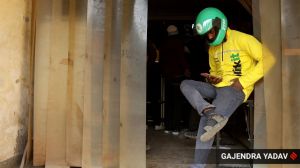India Abroad
The images of India that Prof Ulli Beier once had were those projected most often by the foreign media -- pictures of hunger and poverty....

The images of India that Prof Ulli Beier once had were those projected most often by the foreign media 8212; pictures of hunger and poverty. But now, he has a completely different picture of India. To him it is the genius of Nekchand, the quality of Tyeb Mehta8217;s lines and Husain8217;s poetry which Beier thinks outdo his art. An unusual and an unassuming man, Beier, now 73, has devoted his entire life to arts which include literature, fine arts and music. And he has probably done more than any other person to promote Indian art and music in countries like Germany, Australia, Nigeria and Papua New Guinea.
What has made his contribution to art so exceptional is his approach. When he was teaching Literature in Nigeria and Papua New Guinea in the 8217;50s and 8217;60s, for over 20 years, he realised the debilitating effect of having the culture of the mother colonising country as a benchmark. quot;For instance, in these countries, there was a general assumption that poetry was an English invention and that their own poetry wasonly superstition,quot; says he.
Thus Beier8217;s syllabus, based on native religion, culture and art, was an attempt to help people regain their own sense of identity. And the first truly original poetry, plays and prose of these two countries came out of his classroom. quot;You have to learn to be disrespectful to the language and truly make it your own. You don8217;t have to write in English just like an English man does. Like the West Indians have done, for instance.
They broke all the rules and came out with something original. A process which has just started in India,quot; says Beier. Out of his work came the thought that though the influence of Britain and France on the colonies was overpowering, there was no thoroughfare of ideas between the colonies themselves. quot;They shared a common problem of how to reassess and regain their own identity, specially since foreign influence had become a part of their history. The same questions were being asked and a cross-fertilisation could be of great help,quot; says he.
Beierfirst came across Indian art in the 8217;50s in England at the height of F N Souza8217;s career and printed some of his works in Black Orpheus, a literary magazine he ran in Nigeria. His first visit to India, in 1965, was rather reluctant. He and his wife, Georgia, who has revitalised Papua New Guinea and Nigeria8217;s art as Beier has done their literature, had just seen the Belgian war and were unwilling to face further misery and suffering. But a one-night stop in Bombay during their travels became unavoidable. quot;It was night and we took a taxi into town asking the driver to just take us anywhere. He took us to a temple and it was magical. We sat there the whole night,quot; he recounts.
The next morning they decided to stay back and contacted Nissim Ezekiel, with whom Beier had been exchanging journals for some time. The poet in turn introduced them to Kekoo and Khorshed Gandhy, which opened their window to Indian art even wider. In 1981, Beier set up a centre for art and culture of Non Western countries inBayreuth, Germany, which he ran till 1996, called Iwalewa House. There, he soon organised an exhibition of Indian art, along with that of Nigeria. Husain, Sultan Ali, the Warli artist Saba Mase, Sher-Gil among others were there. That collection remained with him and he loaned it many times to numerous cultural centres in Germany. Beier8217;s great respect for Indian artists co-exists with the knowledge that British thought continues to colour Indian art. While some artists have succeeded in creating art which is Indian and not Indianised, Beier says the whole Western movement of art is reflected in Indian works.
But the biggest factor which pulls him to India is Nekchand 8212; the man who created the Rock Garden in Chandigarh. Beier is in the country primarily to visit this unconventional artist, whose creation is sinking in a bog of bureaucracy. He is alarmed by the apathy of Indians and their government to the Rock Garden which is famous enough for people in England to set up a Nekchand Foundation to save theplace. quot;I will be giving a lecture on Nekchand when I go back to Australia, and the title for it has been picked up from the visitors8217; book in the garden, God has a competitor 8212; Nekchand8217;,quot; says he.
- 01
- 02
- 03
- 04
- 05































